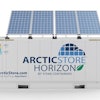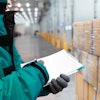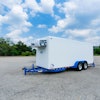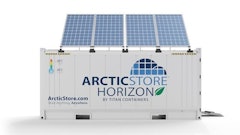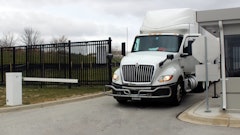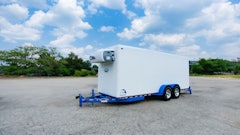For companies that ship food, what are the advantages using a public refrigerated warehouse for their cold storage needs vs. handling the warehousing on their own?
Kappmeier: Obviously the first reason is the cost of construction. To construct a 100,000-square-foot, temperature-controlled facility would cost $12 million. Then the question the food processor must answer is: "How large a building do we build to accommodate how many years of growth?" Thus, leading to the ultimate question the processor needs to answer, which is: "Do we obtain the best return on investment from building and owning a specialized warehouse or from investing in processing assets or market penetration?" Aside from the ownership and ROI concerns, one must also consider the costs of ongoing operation and maintenance of a specialized cold warehouse.
Further, the PRW has in place the personnel highly trained in working in the harsh, cold environment. By using a PRW, the customer only pays for what he consumes; this is especially true in regards to seasonal products. The customer only pays for cases handled and stored as opposed to carrying the annual expense of a fully staffed, partially utilized building during slow periods.
Finally, customers can avail themselves of very efficient transportation at very competitive rates because we can consolidate many shipments from many customers. Statistics can be boring, but just from our nine California facilities, VersaCold ships 22,700 truckloads and performs 83,000 deliveries per year for our customers. The transportation savings alone offer a compelling reason to avail the services of a professional PRW.
For food companies that do decide to outsource their cold storage, is it better to go with public space or contracted/dedicated storage? What are the criteria for making that decision?
Kappmeier: Good question, and there are a myriad of good approaches and answers. If the food company has a large case/weight volume that would support a reasonably sized distribution center and drive efficient and cost-effective transportation, then it could consider a "dedicated" 3PL. If the volume cannot stand alone in regard to transportation, then a PRW with a good transport/consolidation program would provide an excellent, cost-effective alternative. Whether they decide to go with dedicated or PRW space, the deal and all expectations must be put in writing so both parties fully understand the service required and to be delivered.
Statistics seem to indicate that there is no shortage of capacity among the nation’s PRWs. Is this the case, and to what do you attribute that, when so many other industries are experiencing a shortage of space and personnel?
Kappmeier: According to a summary by the U.S. Department of Agriculture, general public warehouse capacity totaled 2.44 billion cubic feet in 2005, which is 3 percent over 2003 capacity and 40 percent above the capacity of 10 years ago. This 3 percent increase translates into an additional 70 million cubic feet, which represents a significant investment.
We will build when and where it will produce the necessary ROI and I believe that would be true for the entire PRW industry.
In what areas do PRWs face the greatest expenses, and what can be done to keep those costs in check?
Kappmeier: Behind labor, electric power is the highest cost item on the profit and loss statement. In that regard, we have had to alter some of our usual daily operational basics, such as implementing door management, charging material handling equipment during off-peak hours and investing in refrigeration plant energy monitoring and control software. We are also hedging energy costs, contracting for the long term for power from the utility companies and investing in energy-saving equipment. In regard to new builds, we design with energy conservation in the forefront.
Of late, a great deal of attention is being placed on safety and security in the food supply chain. How are PRWs responding?
Kappmeier: First, we focus on constantly training employees in the proper receiving, handling, trailer pre-cooling and loading, along with chain of custody and temperature recording procedures and audits. We have adopted warehouse management systems that drive proper product rotation and record the product license plate, allowing accurate trace and recall. Monthly we perform mock recalls on random item numbers to continually audit the process and our accuracy.
The aspect of security starts in the hiring process with the appropriate background checks and in-depth interviews. Proper trailer seal practices are also very important. We take the issues of facility and product security very seriously.
Are there other concerns related to the industry that keep you up at night?
Kappmeier: Personally, I enjoy coming to work every day. We are lucky to be involved in such a necessary business, helping the growers, processors, manufacturers and retailers feed the world. Employees are not worried about their jobs going offshore. We are attracting bright, enthusiastic, hard-working and talented people.
I know that there will be good and bad surprises, but I sleep just fine knowing that at VersaCold our team culture, experience and commitment to working together can get us through almost any surprise. — Leonard Klie
